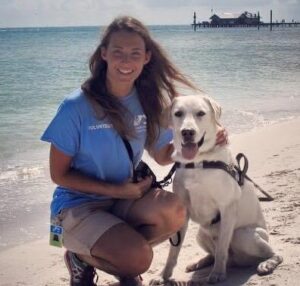Certified service dog coach Kelsey Fernandez holds degrees in psychology and nonprofit management in addition to her CPDT-KA and KPA CTP. She currently works as the director of training programs for a nonprofit service dog organization, Retrieving Independence, in Nashville, Tennessee. Kelsey works with people who are incarcerated, training service dogs to help people with a wide range of disabilities.
What made you decide you wanted to train service dogs?
When I was a student at the University of Georgia, I joined a puppy-raising group that raised future guide dogs. I saw other students taking dogs to class and knew I had to be one of those people! After raising my first guide dog, Anne, I drove to the organization’s campus in New York to see her graduate with her handler. It was the joy and pride I felt watching her work and hearing about all the ways she would bring her handler independence that made me leave that day and think “how can I do this the rest of my life?” I went on to get a bachelor’s degree in psychology, a master’s degree in nonprofit management, and earn my KPA CTP and CPDT-KA.
Tell us about your work training service dogs.
Since graduating my first guide dog in 2013, I’ve raised five more service/guide dog puppies and worked for two different guide dog schools. In 2023, I had the unexpected opportunity to become the director of training programs for a small service dog program in Nashville, Tennessee: Retrieving Independence.
Tell us about Retrieving Independence.
Retrieving Independence is a nonprofit that breeds, trains and places service dogs for mobility assistance, medical alert and response, and psychiatric support. This is all accomplished with the help of volunteer breeder hosts, puppy raisers and our partnership with Tennessee Department of Corrections. People who are incarcerated in the TDOC system provide a significant portion of training to our dogs during the two-year program. Retrieving Independence’s vision is to “see love and dignity rehabilitate inmates and give people living with disabilities greater independence.”
Has offering service dog training had an impact on your work?
Absolutely! Service dog training challenges me each and every day to think outside of the box. As I work with our incarcerated trainers each week, I challenge them to do the same as they encounter training hurdles along the way. Dog training, especially service dog training, is never linear, and I have to be and teach my trainers to be flexible and creative in the process.
What motivated you to enroll in the Service Dog Coach (SDC) program?
Despite 10 years of experience in the service dog industry, most of my experience was with guide dogs. When I became director of training at Retrieving Independence, where we offer a wider variety of service dogs like psychiatric support, mobility and medical alert/response, I felt there was a knowledge gap I needed to fill in order to feel completely confident in my new role. The SDC program was the perfect way to fill that gap!
What did you like the most about the SDC course?
The course was so organized and easy to pace. Despite knowing much of the general service dog information going in, I still found myself learning quite a bit. I really enjoyed all the additional supplemental reading and resources, which I have been able to share with many of our incarcerated trainers as well, fostering some great class discussions!
What has surprised you about working with service dogs?
What has surprised me the most about service dogs is that they never stop surprising me! Every time I think I’ve seen it all, another dog comes along and does something that much more impressive. When I’ve thought “there’s no way a service dog could do that,” there’s always that dog who decides to prove me wrong. The ability of these dogs to understand and adapt and sense things we can’t never ceases to amaze me!
What advice would you give to trainers thinking about getting involved in service dog training?
Fellow service dog program trainers know this, but for private trainers wanting to train service dogs: DO NOT underestimate the difficulty of public access training. You can teach any dog, any age, any breed how to do a service dog task, but if they are not confident and comfortable in public spaces, the team will not be successful. Prioritize this training and socialization from the start. Tasks can always come later.
Is there anything else you wish to share?
If you’re a trainer considering taking the SDC course: DO IT! Not only will you learn so much about service dog training and implementing this training into your business or nonprofit program, but you will be set up to meet the growing demand for service dogs and help bring greater independence to people’s lives through your work.

